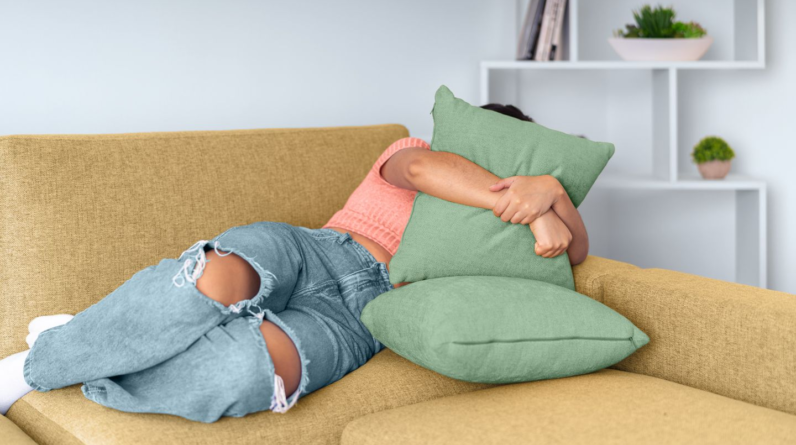
Experts say “hangxiety” (or anxiety plus a hangover) is indeed a real phenomenon.
You may also be feeling anxious and worried about what you said or did the night before.
It's not just you. Feeling anxiety following a night of drinking is so common, it’s sometimes referred to as “hangxiety.”
Hangxiety is not a clinical diagnosis, but rather a hangover symptom that many experience.
“Said shortly, hangxiety is being hungover plus anxiety,” says Rane Wallace, a licensed professional counselor and founder and owner of Fort Wellness Counseling in Fort Worth, Texas. “It’s when you are hungover after drinking while also experiencing anxiety and shame and guilt from the night before.”
The term “hangxiety” is now fairly widely used, though the official origins of the verbiage are unknown. Wallace says it likely popped up somewhere online and took off.
It could be a result of the sober curious movement that has been on the rise in the past few years, he says. “Or it could also be a result of our culture being more and more receptive to talking about mental health and alcohol abuse.”
RELATED: Scientific Fixes to Recover From a Hangover
But the brain wants to get back to normal. “The brain always wants to stay in balance and whatever feelings you manufacture with alcohol, the brain will cause the exact opposite feeling to maintain homeostasis,” Tietz says.
“Alcohol slows down brain activity, and your brain will release neurotransmitters that speed up brain activity to counteract all the alcohol you drank,” she says. As a result, those calm feelings give way to more anxious ones once the effects of alcohol diminish.
“Heavy drinking also releases cortisol, a stress hormone. And when the alcohol wears off, your body is under increased stress,” Tietz says. “Lastly, alcohol affects the electrical signals in the heart and the more alcohol you drink, the faster your heart beats.”
“The biggest difference between the two is the duration of the symptoms,” Wallace says. “With hangxiety, it can be a day or two.” An anxiety disorder, by definition, means that symptoms (excessive anxiety and worry) have been ongoing (on more days than not) for at least six months.
In addition to being persistent, an anxiety disorder tends to impact various areas of one’s life, such as work or relationships, Wallace says.
Hangxiety, on the other hand, is a type of everyday anxiety that people tend to experience from time to time while they’re sobering up after drinking, Wallace says. But it tends to be temporary and subside over time.
RELATED: Are You Just Feeling Anxious, or Do You Have an Anxiety Disorder?
RELATED: Expert Hacks for Preventing a Hangover
But that advice does little good if you’re currently battling hangxiety. In that case, Wallace suggests treating the physical hangover by hydrating, resting, avoiding caffeine, and eating a healthy meal.
Then, treat the anxiety symptoms by taking the following steps:
Whatever you do, don’t reach for another drink to get through the day. “That’s a bad recipe for developing more of a long-term dependence,” Wallace says.
Finally, if you find yourself dealing with hangxiety regularly and suspect you need to take a closer look at your relationship with alcohol, you probably do. “People without alcohol problems don’t typically question if they have a problem with alcohol,” Wallace says. “And so, if there is any doubt, at the least talking about it and exploring that could be helpful.”
Another option is taking the online self-assessment from the Alcohol Use Disorders Identification Test (AUDIT), which can help identify possible problematic screening.
RELATED: Is Alcohol Use at Any Level Actually Healthy?
Everyday Health follows strict sourcing guidelines to ensure the accuracy of its content, outlined in our editorial policy. We use only trustworthy sources, including peer-reviewed studies, board-certified medical experts, patients with lived experience, and information from top institutions.
By subscribing you agree to the Terms of Use and Privacy Policy.
What can therapy help with? Here’s a closer look at the types of therapy and their benefits for mental health.
Research shows having a sense of purpose comes with a lot of benefits for health and well-being. Here’s more from psychologists on how to find yours.
Experts aren’t yet sure how Ozempic affects people with depression because they were excluded from clinical trials. Here’s what we know so far.
Surgically implanted vagus nerve stimulation devices may help with some mood disorders. Whether DIY strategies yield the same effects is an open question…
Here are some pros and cons about keeping a health issue to yourself, plus 5 tips for how to do it.
Researchers are studying how drugs like ketamine, MDMA, and psilocybin can be used medicinally to ease symptoms of depression, anxiety, and other mental…
Where can Black Americans turn for help? Here's a list of resources.
Explore the top online therapy services reviewed and tested by experts. Find the best platforms for mental healthcare needs, preferences, and budgets….
This guide includes the most affordable online therapy options in 2024. Our review compares the most popular providers based on cost and insurance coverage…
Choosing the best online psychiatrist for your needs can be hard. Our experts researched, reviewed, and rated the top online psychiatry services so you…
By subscribing you agree to the Terms of Use and Privacy Policy.






